France is the hub of Sino-European economic and trade ties, while Hong Kong is an important platform for overseas investors to tap into the Mainland market. Both sides could promote further economic cooperation between China and Europe if they can leverage each other’s strengths and jointly explore the huge potential for development under the “Belt and Road Initiative”.
At the “Economic Forum France, Hong Kong & Mainland China” co-organized by the Chamber, Business France and China Federation of Industrial Economics in Paris, Jonathan Choi, the Chamber’s Chairman, pointed out that France is the hub of Sino-European economic and trade ties, while Hong Kong is an important platform for overseas investors to tap into the Mainland market; both sides can leverage each other’s strengths and jointly explore the huge potential for development under the “Belt and Road Initiative” to promote China-Europe economic cooperation.
Leverage Hong Kong’s strengths to promote cooperation
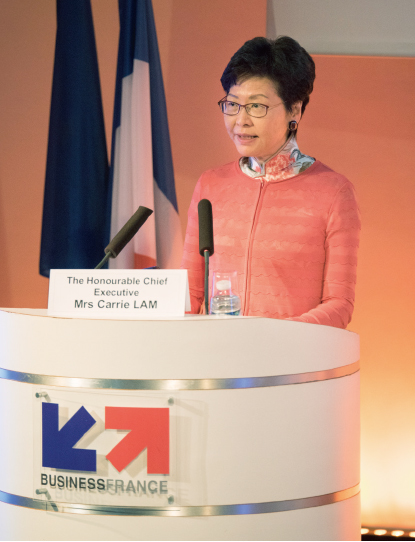 When briefing the French business community on the role that Hong Kong can play in the development of the “Belt and Road” Carrie Lam, Chief Executive of the HKSAR, said that since Hong Kong embraces free flow of capital and has a deep pool of global financial talents, it is the ideal centre in which to raise funds for infrastructure and investment projects, as well as to provide risk management, insurance and dispute resolution services. This year marks the 40th anniversary of the country’s reform and opening up. Lam was glad to learn that the Mainland would further open up its services and financial sectors and continue to expand the scope of RMB internationalization. This means that Hong Kong can continue to leverage its strengths to assume a hub role in the “Belt and Road Initiative”. She also mentioned that green finance as well as asset and financial management are set to become the new drivers for Hong Kong’s economy.
When briefing the French business community on the role that Hong Kong can play in the development of the “Belt and Road” Carrie Lam, Chief Executive of the HKSAR, said that since Hong Kong embraces free flow of capital and has a deep pool of global financial talents, it is the ideal centre in which to raise funds for infrastructure and investment projects, as well as to provide risk management, insurance and dispute resolution services. This year marks the 40th anniversary of the country’s reform and opening up. Lam was glad to learn that the Mainland would further open up its services and financial sectors and continue to expand the scope of RMB internationalization. This means that Hong Kong can continue to leverage its strengths to assume a hub role in the “Belt and Road Initiative”. She also mentioned that green finance as well as asset and financial management are set to become the new drivers for Hong Kong’s economy.
She pointed out that Hong Kong and France have always maintained close economic and trade ties, and many French engineering and construction-related companies are very well established in Hong Kong. They should be able to apply their extensive experience in infrastructure projects with Hong Kong’s professional services to tap broader opportunities in the “Belt and Road” markets, while making full use of the development opportunities in the Guangdong-Hong Kong-Macao Bay Area as an important node linking the Mainland and the “Belt and Road” regions. She added that trade disputes will be resolved in a fair and transparent manner under Hong Kong’s sound rule of law system. Therefore, she sincerely invites French businesses to invest in Hong Kong and jointly grasp the “Belt and Road” opportunities.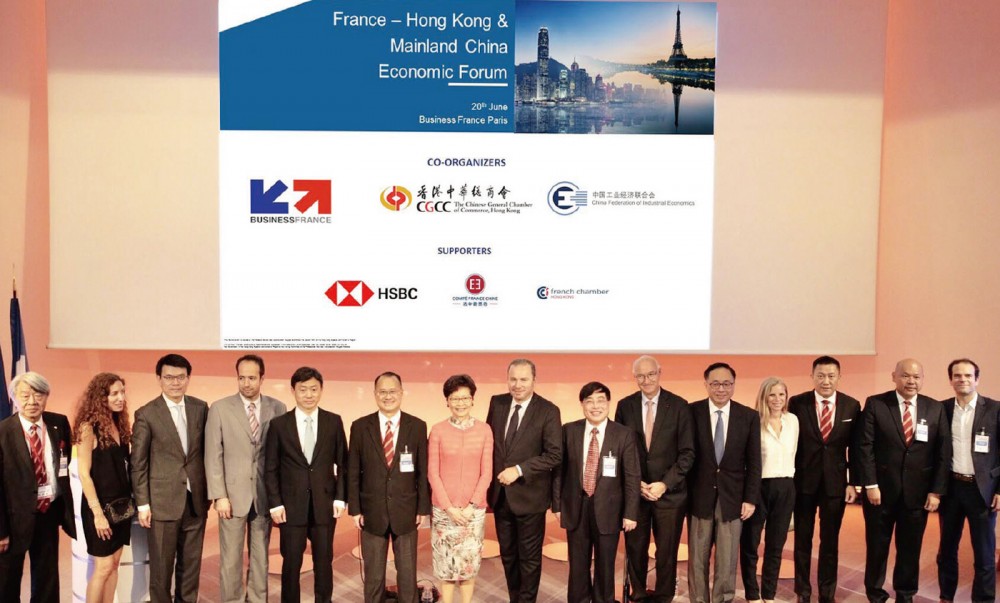
Broader prospects for China-France cooperation
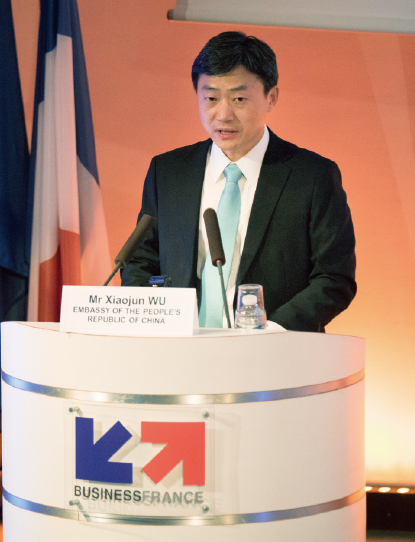 Wu Xiaojun, the Chargé d’Affaires of the Chinese Embassy in France, pointed out that the “Belt and Road Initiative” may be China’s idea, but the opportunities and outcome are for the world. Since the Initiative was put forward, it has received wide attention from the international community and brought opportunities for cooperation among the countries along the route. China has invested over USD60 billion in the countries involved in the Initiative, established 75 overseas economic and trade cooperation zones, and created more than 200,000 jobs for the local governments. This shows that China-Europe trade and economic ties are unprecedentedly close.
Wu Xiaojun, the Chargé d’Affaires of the Chinese Embassy in France, pointed out that the “Belt and Road Initiative” may be China’s idea, but the opportunities and outcome are for the world. Since the Initiative was put forward, it has received wide attention from the international community and brought opportunities for cooperation among the countries along the route. China has invested over USD60 billion in the countries involved in the Initiative, established 75 overseas economic and trade cooperation zones, and created more than 200,000 jobs for the local governments. This shows that China-Europe trade and economic ties are unprecedentedly close.
He pointed out that the “Belt and Road Initiative” has also opened up broader prospects for Sino-French cooperation. France has both far-sightedness and innovative ideas and is an important partner for China. During his visit to China earlier this year, Emmanuel Macron, President of France, expressed support for the “Belt and Road Initiative” and signed several agreements with China. He added that Édouard Philippe, Prime Minister of France, will also pay an official visit to China and will further exchange views in this regard. He believes that as China and France have high political mutual trust, strong economic complementarity, and mature cooperation mechanisms and legal frameworks, they can play a leading role in the joint efforts of China and Europe in developing the “Belt and Road”. Wu looks forward to all sectors of the society actively participating in the “Belt and Road” development. He believes that collaborative efforts will lead to more visible and tangible results to benefit not only both parties, but also the rest of the world.
Extensive cooperation on infrastructure and finance
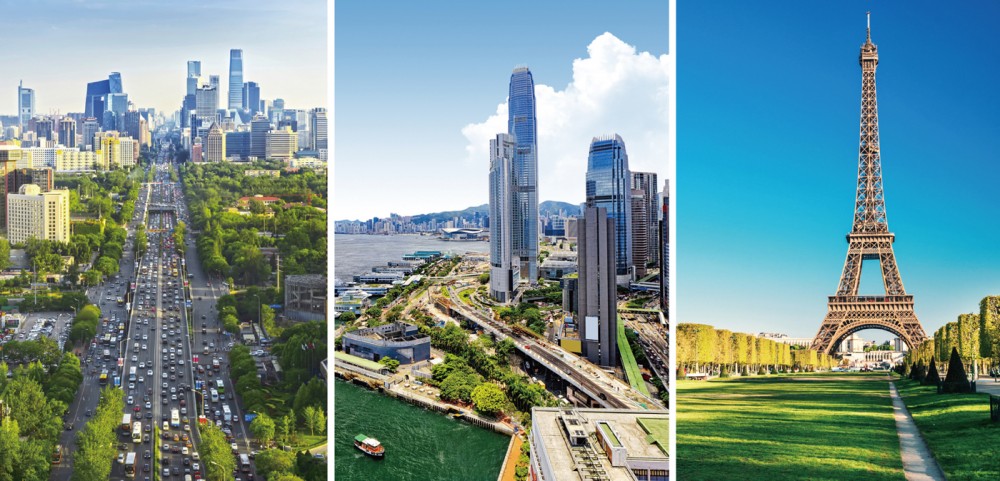 During discussions in the forum, many business leaders, managers and professionals from Hong Kong, the Mainland and France discussed the opportunities for cooperation on Asia-Europe infrastructure project management and financing during the development of the “Belt and Road”. They also discussed ways to further strengthen regional economic and trade ties on the basis of economic innovation and development.
During discussions in the forum, many business leaders, managers and professionals from Hong Kong, the Mainland and France discussed the opportunities for cooperation on Asia-Europe infrastructure project management and financing during the development of the “Belt and Road”. They also discussed ways to further strengthen regional economic and trade ties on the basis of economic innovation and development.
From the perspective of management and operation of infrastructure railway projects, Gillian Meller, Legal and European Business Director of MTR Corporation, spoke about the MTR Academy’s tailor-made courses for rail management and operation personnel from Hong Kong, the Mainland and the rest of the world in support of the “Belt and Road Initiative” and development of the railway industries in Hong Kong, the Mainland and the rest of the world. Nicholas Ho, Deputy Managing Director of Ho & Partners Architect (hpa), introduced the advantages and functions of Hong Kong’s professional services in the fields of architectural design and engineering, and shared his experience in collaborating with Mainland enterprises to tap into the Europe and “Belt and Road” markets. Sévérine Chapus, Vice-President of Territories & Cities of Dassault Systèmes, said that his company provides application system support for industries such as aerospace and automobiles; Asian and European companies can provide a wide range of system services for transportation infrastructure projects by promoting emerging technologies such as digital transformation and smart manufacturing.
In addition, Sébastien Guillo, Head of Strategy of HSBC France, stressed that the “Belt and Road Initiative” has greatly strengthened ties and foreign trade around the world. Therefore, Mainland China, France and Hong Kong should broadly step up collaboration on financial services, including establishing a multi-faceted platform for cooperation on financing, risk management, green finance and others. Li Hong, General Director of Broad Sustainable Building Company Europe, said that her company’s business covers medical health and commodities trading; as China actively strengthens ties with countries involved in the “Belt and Road Initiative” for environmental, technological and industrial cooperation, Asia and Europe will also usher in a broad space for development in the infrastructure sector such as environmental technology.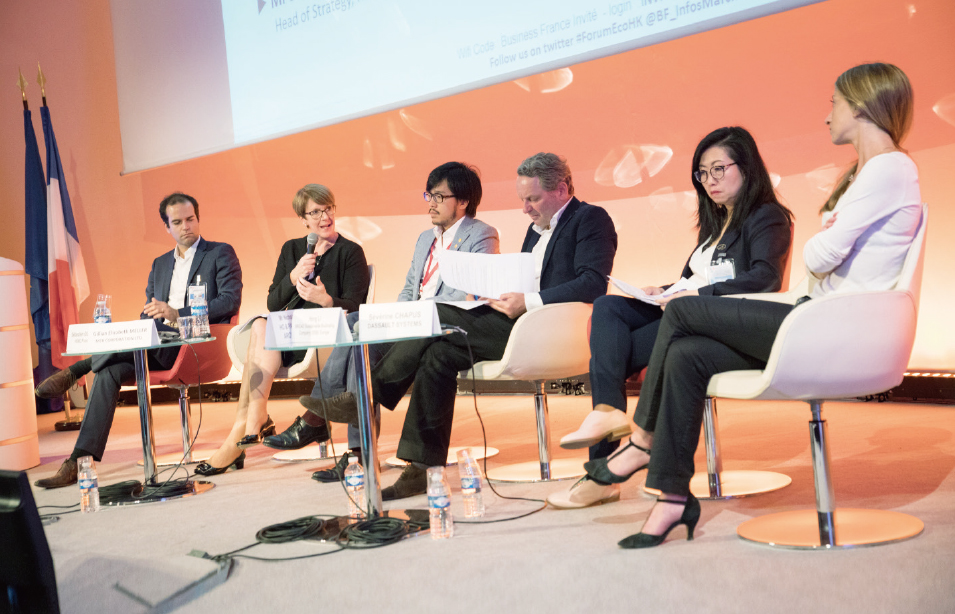
I&T has unlimited potential
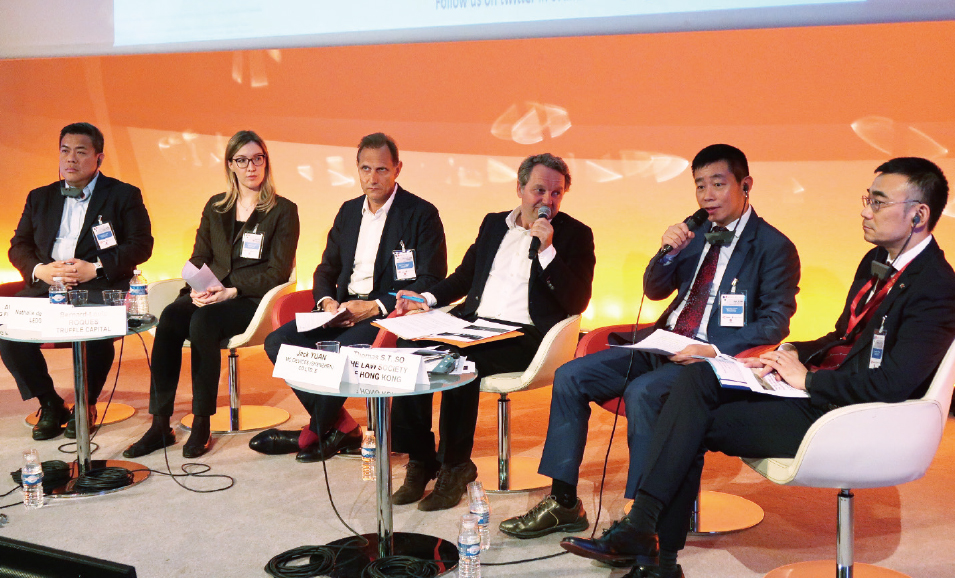 With regard to innovation and technology (I&T) cooperation, Alex Kong, Chairman and CEO of TNG Fintech Group, presented the latest developments in Hong Kong in the fields of e-wallet and financial information technology, including “TNG Wallet, Hong Kong’s e-wallet” created by his company, which has brought local paperless payment to a brand-new stage. He stressed that Hong Kong should more actively leverage its strengths in fintech to further tap into the markets involved in the Belt and Road Initiative and in Europe. Jack Yuan, CEO of MC Devices (Shenzhen) Co Ltd, said that the world has entered the era of Internet of Things and artificial intelligence, and China has already become the world’s largest chip consumer market. He looks forward to supplying more China-created products to the market in the future. He also hopes that more European companies will team up with Mainland and Hong Kong technology companies to explore the opportunities in the “Belt and Road” markets.
With regard to innovation and technology (I&T) cooperation, Alex Kong, Chairman and CEO of TNG Fintech Group, presented the latest developments in Hong Kong in the fields of e-wallet and financial information technology, including “TNG Wallet, Hong Kong’s e-wallet” created by his company, which has brought local paperless payment to a brand-new stage. He stressed that Hong Kong should more actively leverage its strengths in fintech to further tap into the markets involved in the Belt and Road Initiative and in Europe. Jack Yuan, CEO of MC Devices (Shenzhen) Co Ltd, said that the world has entered the era of Internet of Things and artificial intelligence, and China has already become the world’s largest chip consumer market. He looks forward to supplying more China-created products to the market in the future. He also hopes that more European companies will team up with Mainland and Hong Kong technology companies to explore the opportunities in the “Belt and Road” markets.
Thomas So, Immediate Past President of the Law Society of Hong Kong, discussed the possible legal problems involved under the rapid development of the innovation economy. He specifically explained Hong Kong’s leading position in arbitration and legal services. He believed that Hong Kong is qualified to become an international dispute resolution centre and recommended France’s SMEs to more frequently use Hong Kong’s legal and professional services. Bernard Louis Roques, Co-founder of France-based Truffle Capital, and Nathalie de Gaulle, Head of Government Affairs and Central Banks of LEDGER, analyzed Asia-Europe economic cooperation potential and investment opportunities from the perspective of finance and investment. They believed that as Hong Kong is an international business hub linking the Mainland and overseas, it can provide SMEs with efficient professional and business advisory services and support to tap into the markets involved in the “Belt and Road Initiative”.




